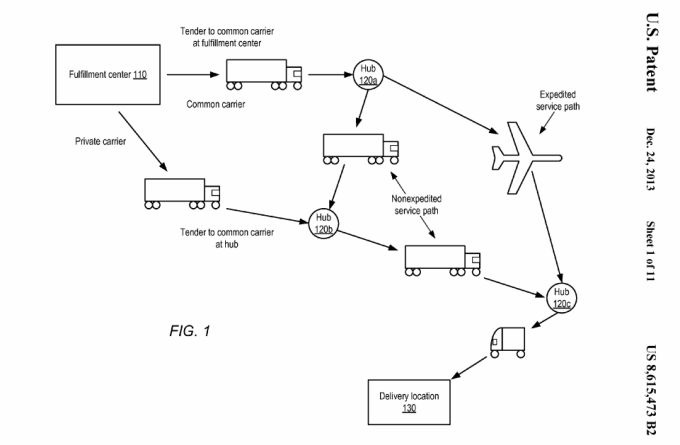Amazon's Anticipatory Shipping Patent Explained
At the tail end of 2013, Amazon (AMZN) obtained issuance of an interesting patent, claiming a system and method of anticipatory shipping, i.e. shipping one or more items in your general direction before you even purchase said items. The patent, entitled “Method and system for anticipatory package shipping,” can be read here.
Of my own observation, Amazon’s patent has been met with a good degree of 1) animosity fueled by 2) misunderstanding resulting from 3) laziness on the part of the reader. Common among the litany of comments in stories covering this patent are complaints of cyber-voyeurism and disgust at having to pay for an item not ordered. So what does this patent really say? Is Amazon really delivering items to you and subsequently trying to demand payment? Short answer, no.
Let’s take a look at the first figure Amazon includes in the patent at issue, U.S. 8,615,473.

As laid out by the patent’s repetitive specification (a compliment in the patent world), the process begins at fulfillment center 110. A packaged product starts at the fulfillment center, where it can be taken by any number of carriers (UPS, USPS, FedEx etc.) to be delivered to a particular “geographical area,” stopping at one or more hubs (a warehouse for instance) along the way. Thus, Amazon ships an item to a geographical area such as a zip code or city, awaiting purchase of said item by a person within or in close proximity to that geographical area.
Before purchase, the item may ping-pong around different carrier vehicles or hubs within the geographical area. Upon being purchased, the item then makes the short trek to your home or place of business rather than being shipped cross-country. This shortens delivery times and makes it easier for Amazon to honor its expedited shipping requests, such as those from Amazon Prime subscribers.
Some customer confusion with regards to unwanted deliveries and payment thereof may have spawned from the following excerpt of the patent specification, in which Amazon states:
…Rather than incur the potential cost of returning or redirecting a package 260 without a sale, some or all of the potential cost may be offered as a discount to a potentially interested customer, such as via e-commerce portal 290a, as an inducement to convert the potential interest into an order. In some instances, the package 260 may be delivered to a potentially-interested customer as a gift rather than incurring the cost of returning or redirecting the package 260. For example, if a given customer is particularly valued (e.g., according to past ordering history, appealing demographic profile, etc.), delivering the package 260 to the given customer as a promotional gift may be used to build goodwill.
Essentially, Amazon is stating that their anticipatory shipping is not perfect, and as such, may deliver a product to a geographical area which does not end up getting purchased at sticker price by an Amazon customer associated with that geographical area. After a certain point in time, it becomes financially preferable to offer said product online to Amazon shoppers within that geographical area at a discount or deliver that product to a valued customer completely free of charge.
As for the charges of cyber-voyeurism linked to this patent, they are valid in one sense and invalid in another sense. On the one hand, Amazon does collect an enormous amount of data from its users, including Amazon search history, purchase history, cart history, length of page views, and other similar data.
On the other hand, Amazon and many other large Internet-based companies (Google, Facebook, Yahoo, etc.), have been collecting this data for quite some time, catering content to you based on your past interactions, posts, searches, and purchases. Amazon is simply taking this information and implementing it in a novel manner to deliver products to users faster than ever before. In other words, if there is ire to be had over this process, direct it, on principle, to the collection of mass data as a whole, not to Amazon’s use of this data, because anticipatory shipping as a concept it is utterly brilliant.
Remick Stahl
Law Clerk at
JAFARI LAW GROUP®

